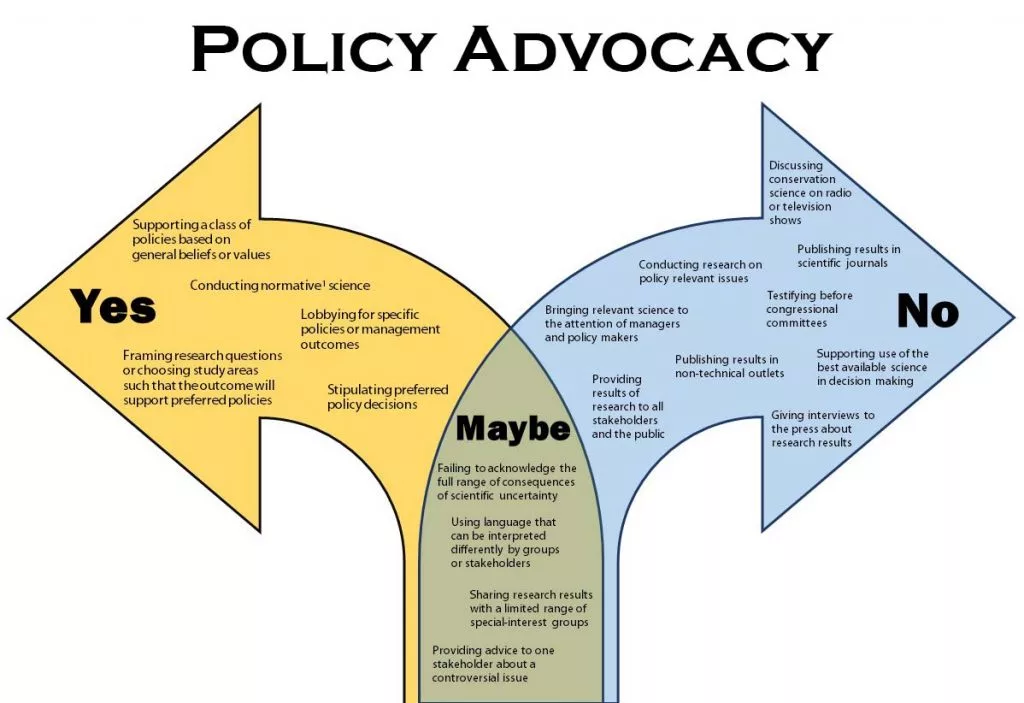Importance of Policy Advocacy
Compiled from Speech of one of the
Former Presidents, FBCCI
In a free economy the private sector is in the driving seat while the public sector is a facilitator. For doing business the private sector needs facilities and services from the government and also has to work within the government regulatory environment. For obtaining facilities and services, for responding to the regulatory obligations and for ensuring participation in policy formulation dialogue the private sector has to plead its causes to the government. To make such advocacy work the private sector must ensure that the private sector’s “voice is heard” by relevant government decision-makers concerned with the country’s long term international competitiveness and that the private sector’s voice is both informed and consistent.
For reviewing the effectiveness of the Business Advocacy by the Private Sector to the Public Sector in any Country the following aspects should be taken into accounts:
(i) Who plays what role in the economy: Respective role of public and private sectors towards economic development, poverty reduction, export promotion and structural changes?
(ii) Out look of the Government regarding private sector development: State of Affairs of Public – Private Partnership (PPP)
(iii) Why advocacy is necessary: For transfer/removal/moderation of regulatory functions/ regulatory barriers of the Government and its effectiveness.
(iv) Why advocacy should work: Because of, Private Sectors strength and weight to convince the Public Sector.
(v) How organized is the Private Sector: Capacity building of the Chambers / Associations and other private sector institutions (PSIs) to perform the new regulatory functions that could be delegated to them.
The Respective Role of the Public and Private Sectors and Public-Private Partnership:
Due to globalization and liberalization of trade and investment the Public and private sector have assumed new roles to play. Private sector is now recognized all over the world to be the prime engine of growth of the economy as it is better able to deploy innovative management technique, as well as has greater determination to be efficient, competitive and profitable. The higher efficiency and profitability of the private sector help in creating more employment and in maximizing growth of economy.
2.1 The need for the Government to work closely with the private sector has become much more important now than ever before. Government is now in the process of implementing seriously various reform measures and it has to know precisely how the economy is coping with the shocks of the reforms in order to decide about their extent and pace. More particularly important is to know how the private businessmen and entrepreneurs, the so-called engine of the growth, is taking them while facing the challenges and seizing the opportunities of globalization. It is expected that Government would keep its ears well-tuned to the private sector and ensure the latter’s co-operation and assistance in order to steer the processes of policy formulation and strategy enunciation in as much fault freeway as feasible. At the very least, in a democratic system, governance has to be participatory for which meaningful dialogue between the Government and the private sector is essential.
2.2 The growth and performance of a vibrant and dynamic private sector need a lot of support and facilities from the government institutions. There must be an efficient and business friendly administration. The facilities and services that an investor need is, among others, acquisition of land, connection of electricity, gas, telephone, water and sewerage, clearance from local authorities and environment authority, port facilities, customs clearance, etc. These should be available promptly and without hassle. The need for these is well recognized in government policy. It is an accepted and declared policy that government shall act as a facilitator and government is trying to provide required facilities.
The Government of Bangladesh has over the last one decade been engaged in the creation of an inviting environment by playing facilitatory role through removal of policy deficiencies, regulatory impediments as well as by offering better public services to the private sector for enabling the private sector to operate smoothly and be more competitive in local and global markets.
2.3 In sector strategy and governance the public sector should retain the areas of (i) Fiscal Strategy (ii) Promoting efficient sector development and public and private participation by rationalizing sectoral incentive regime (iii) Policy and regulatory environment (iv) Pricing and compensation policies.
2.4 On the other hand the private sector should participate in all other areas including downstream activities in power, gas and petroleum and in fixed telephone line and mobile market, in addition to industry and trade.
2.5 Changes in successive industrial policies have led to the opening up of almost all the sectors of the economy to private investment and significant relaxation of the sanctioning barriers to industrial investment. Privatization of the Public Sector Enterprises (PSEs) and reduction of the public sector in industrial investment on a continued basis have given added fillip to the growth of the private sector. Legislation on protection of foreign investment from expropriation, export promotion zones (both in the public and private sectors) modernization of banking and financial laws, introduction of bankruptcy act etc., have furthered the environment for private sector investments. Drastic reduction and compression in tariff rates and the QRs, diverse export promotion measures and reforms in foreign exchange regime have led to phenomenal growth in non-traditional exports. As a result, the private sector investment rose from a tiny 11% of the total investment under the First five-year plan to 44% in the Fourth five-year plan and was projected to 56% under the Fifth five-year plan.
2.6 Private sector has responded positively to the challenge thrown before them. The RMG sector of Bangladesh has already demonstrated that if private sector is allowed to function freely it can contribute greatly to the achievement of the national goals of rapid industrialization and economic development.
Poverty reduction and sustainable development is the priority goal of Bangladesh and has been working towards formulating a “National Strategy for Economic Growth and Poverty Reduction”. This strategy implies accelerated manufacturing growth to increase its role in poverty reduction through labour intensive SMEs and export oriented industrialization. This would call for government efforts to accelerate privatization of the SOEs, streamlining and reforming the existing legal and regulatory framework, among others.
Why advocacy is necessary?
The Private Sector plays a vital role to develop trade industry, agriculture, human resources, and communication sectors. It also make necessary interaction with the Government to project encourage and safeguard the interest of the private sector. As indicated earlier the Private Sector to ensure a business friendly environment needs government facilities and services for:
- Infrastructure like acquisition of land and utility connections.
- Trade facilitations from institutions like Board of Investment (BOI), Export Processing Zone (EPZ) and Export Promotion Bureau (EPB)
- Trade related capacity building like Railway and Road Connection, Port facilities, quality standards.
- Moderate, simplified and operative regulations and
- Negotiation with World Bodies
3.1 The Public Sector on the other hand while framing Policy on these issues consults the stakeholders in the Private Sectors. This is the foundation of the Public – Private Partnership (PPP)
Private sector matters generally spread over four ministries viz. Commerce, Industries Jute & Textiles and four promotional agencies namely Board of Investment (BOI), Export Promotion Bureau (EPB), Bangladesh Export Processing Zone Authority (BEPZA) and Bangladesh Small and Cottage Industries Corporation (BSCIC),
Ministry of Commerce and Ministry of Industry are the two main ministries, which are directly involved in the regulation and promotion of the Private sector.
The MOC administers its regulatory laws mainly through 4 agencies Offices of the (i) Director of Trade Organizations (DTO), (2) Chief Controller of Imports and Exports (CCI&E), (3) Registrar of Joint Stock Companies and Firms and (4) Export Promotion Bureau (EPB).
3.2. Ministry of Industries administers its regulatory laws mainly through (1) Bangladesh Standards and Testing Institute (BSTI), (2) Director General of Patents, Designs and Trademarks Registry and (3) The Chief Inspector of Boilers. It also discharges some regulatory cum promotional activities through (1) Bangladesh Industrial Technical Assistance Centre (BITAC), (2) National Productivity Organization (NPO) and (3) Bangladesh Small and Cottage Industries Corporation (BSCIC).
3.3 Price and quality control were the traditional regulatory functions of the Jute and Textiles Directorates. With the globalization of apparels market these regulatory functions of the Ministry of Textile (MOT) has ceased to exist. Similarly with the drastic fall in demand for Jute and Jute products, the international market determines the price. Regulatory responsibility of the Ministry of Jute (MOJ) basically is to ensure quality and grading of Jute so that the existing market for the Jute can be sustained and advanced.
3.4 BOI and BEPZA, the two important institutions created to promote private sector industries are placed under the Prime Ministers Office (PMO). BOI was established, replacing the old DOI (Department of Industries) in 1989 for accelerating private investment, domestic and foreign, through provision of a package of facilitation services and was placed under the PMO to provide necessary clout. It was supposed to act as “One Stop Shop” for providing investors with infrastructure, utility, imports and regulatory services, This, it was expected, would save the investors from considerable official rigmarole and cost, thus promoting enabling environment. One stop service involved co-ordination and commitment from as many as 9 organizations spread over 5-6 ministries.
3.5 Other Regulatory Departments/Directorates, which have significant bearing on the Trade & Industries, are the Customs Department, Inspectorate of Factories & Establishments, Directorate of Labour and Department of Environment. In addition a host of other ministries/ departments/ subordinate offices also exercises minor regulations on trade and industries.
3.6 Apart from complexity of the regulations administered by these government regulatory bodies mentioned above most of the offices administering these regulations are weak and lacks expertise, training and equipment to provide quality services. Compensation packages are inadequate to attract professionals. Apart from reforms of the laws and regulations they need institutional strengthening which may suggest restructuring /privatizing some of these bodies
3.7 While policy environment has made rapid progress, procedural problems have been a major stumbling block. There is a veritable extortion at each stratum that stifles initiative and enhances cost of business. Liberalization and reforms policies have paid little attention to the mass of regulatory barriers that impede development and functioning of commerce and industries.
Characteristics of the Regulations:
3.8 Numerous regulations, mostly legacies of the colonial era to protect their vested interests, have grown under successive governments. Due to lack of any coordinated development over years, in fact centuries, they have grown to enormous proportions. The governments of the day introduced them, ostensibly out of paternalistic concerns to protect the rights of citizens against monopoly, market failure & considerations of equity. These regulations are so wide spread that they affect the citizens in almost in all walks of life, to the extent of being repressive, impeding economic activities.
3.9 No-body exactly knows as to how many major or minor rules and regulations govern business and industries for no compendium enlisting them appear to be available. Many of them are archaic and irrelevant in the present day context. Some of them although necessary are needlessly complicated, vague, thus subject to discretion of low-level functionaries who administer them, providing scope for corruption. They need modernization and simplification. Some of these regulations administered by the public bodies to further the interest of the private sector are inefficient because they are inherently ill equipped to deal with those functions. Industrial policies 1999, therefore, rightly, stressed on the “removal of all regulatory barriers” within the quickest possible time to facilitate easy and rapid flow of FDIs and domestic private investment and to put in place appropriate legal framework to protect both investor’s and consumer’s rights to ensure proper market operation and consequently, for lowering cost of doing business.
3.10 On reviewing of the regulatory agencies and their functions the private sector at large including chambers and associations feel that there are good reasons for transferring some of the regulatory functions of the government to the open trade body i.e. The Federation of Bangladesh Chambers of Commerce and Industry (FBCCI) and some other private sectors institutions (PSIs).
Why should Business Advocacy work?
4.1 In the context of Bangladesh Public-Private Partnership is bound to grow strong further because:
- By now Private Sector wields important socio-economic influence in the society.
- Trade bodies, Associations and PSIs have by now institutionalized their activities and developed think tanks and expertise to respond to WTO regulations, offer specific suggestions for reformations of government regulations.
- Government machinery is increasingly becoming weak because of financial constraints, frequent transfer of expert officers and rent seeking attitude of the officials.
- The Public Sector believes that initiation should come from the Private Sectors as it believes in liberalization. “The Private Sector should chart the course of its action”-government believes.
4.2 In Bangladesh, though relatively new and inexperienced, the private sector have already demonstrated its capability and buoyancy in the economy. A new generation of private sector entrepreneurs has emerged who are well educated, hard working, capable and eager to face the challenges of the globalized competitive market. They have proven their mettle in all sectors where they had opportunities to work with freedom and where the Government played the role more of a facilitator than a controller. The booming industries in ready-made garments, knitwear, shrimps, leather, ceramics etc. are clear indicators of the latent capabilities of the private sector and they also act as pointers to what the Government should do in capturing these potentials. It may be in order to show a few illustrations of promising performance of the private sector.
First, private sector’s share in investment shows a rising trend increasing from 10.27 percent in 1990-91 to 15.61 percent of GDP in 1999-2000 and 17.5 percent in 2003-04 while that of public sector stagnates between 6-7 percent. The growing emphasis on the private sector is reflected in the fact that the share of the private sector investment increased from 11 per cent in the First Five year Plan to 44 per cent in the Fourth five years Plan.
Second, private enterprises are more efficient than state owned enterprises in respect of utilization of assets for generation of employment and value addition. Owning 37.62% of fixed assets private enterprises accounts for 74.57% of employment and 66.2% of value addition while owning 62.38% of fixed assets the state owned enterprises (SOEs) account for only 25.43% of employment and 33.79% of value addition as in 1989-90.
Third, the private sector performance is more spectacular in foreign exchange earnings from export. Out of the total foreign exchange earning of US 7.60 billion in 2003-04, private enterprises represented more than 94% of the total export earning which has risen from 74.27% in 1990-91.
Conclusion
Encouraged by the liberal attitude of the government for expanded participation by the Private Sector, recently a study was made of the Government Regulatory Functions that can be transferred to FBCCI and other Private Sector Institutions (PSIs). The study recommended transfer of some regulatory functions to selected PP’s or privatized.
5.1 However, a considerable legal reform on the one hand and capacity building of these institutions on the other is required before any of the PSIs would be in a position to effectively handle those functions. The Chambers/Association would not only need significant institutional strengthening but also financial strengthening. Some of the stakeholders felt that apart from institutional and resource constraints, most of these bodies are overly politicized, hence fairness and impartiality of their decision may be in doubt. Besides, they do not have the maturity to handle regulatory functions. Hence some of the regulatory function may be privatized and contracted out to professional firms, rather than allowing the Chambers/Trade bodies to handle them.
5.2 Two recent experience of privatization from which lessons can be drawn with regard to the present proposition are (1) responsibility of determining Consumption and Utilization Declaration with respect to the garment industries, by the BGMEA since 1994 and (2) Introduction of Pre-shipment Inspection System(PSI) for clearance of imports contracted out to the private agencies since early 2000. Despite some incidents of lapses and misuse of the power vested in the BGMEA they have coped with the tremendous increase in the volume of work involved reasonably well. The biggest gain is that this has helped in cutting down delay in shipment, saved the garment enterprises from the payment of speed money and the hassles involved and helped BGMEA to strengthen financial position by levying service charges on the UD certificates etc. It also saved the government of the additional fund that may have been required to hire additional people to handle the increased workload.
5.3 The regulatory functions that may be transferred to Private sector say FBCCI and other PSIs are:
- Trade License & Renewal
- Dealership License & Renewal (for freely importable commodities) excluding licenses issued under Gold (Procurement, Storage and Distribution) order, 1987, Poisons Act, 1919 and (5) The Petroleum Act, 1954.
- Import Registration Certificate (IRC) & Renewal.
- Export Registration Certificate (ERC) & Renewal
- Indenting Registration Certificate (Ind, RC) & Renewal
- Certificate of Incorporation of Enterprises under Company Act, 1994
- Issuing Work Permit to expatriate personnel working in private sector industrial enterprises.
- Allocation of Quota and its administration except visa & license
- Development and Allotment of the BSCIC industrial Estates.






0 Comments